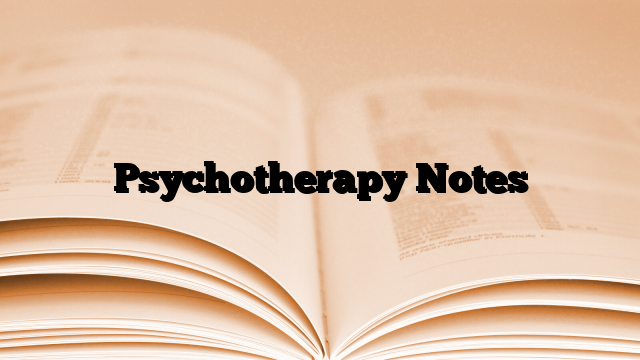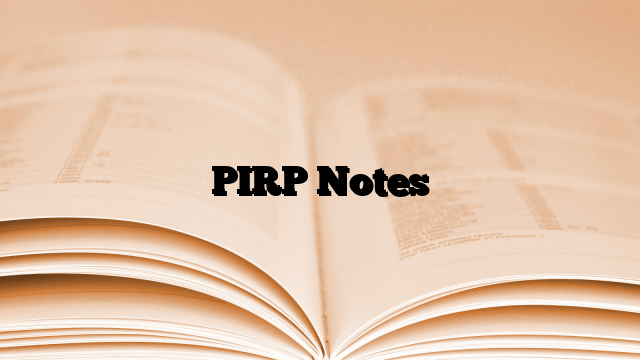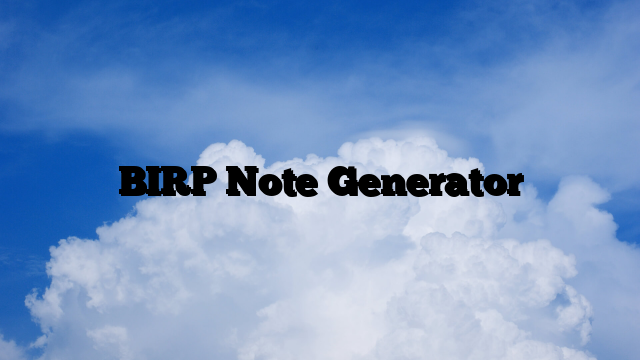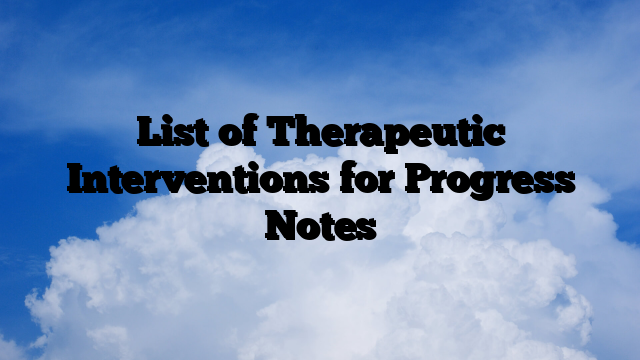Psychotherapy notes hold fundamental significance for behavioral health professionals to deduce the right diagnosis of clients from their sessions. These notes help the professionals to analyze the conversations that were carried during the counselling sessions. clients do not have access to these notes as the purpose of the psychotherapy notes is exclusively for the therapist to reflect on the client’s mental health and to plan the future sessions. As the notes are only accessible to the therapists, that is why therapist can include untested hypothesis and incomplete theoretical frameworks to understand the case under consideration. Psychotherapy notes may include therapist’s observations and reactions. The notes do not include: diagnosis, prescription of medicines, symptoms, and results of clinical tests (TheraPlatform, 2019).
Unlike Psychotherapy notes, progress notes include official records of client’s progress which are accessible to the client and insurance providers. Progress notes are also essential for the legal documentation and billing purposes. client’s diagnosis, medical prescription, clinical tests, symptoms, and treatment plan are parts of progress notes. Progress notes also help other healthcare professionals to have a detailed medical history of the client otherwise with every new therapist, the treatment would begin from the scratch (iCanotes, 2018). Both types of notes are essential for behavioral health professionals, the major difference between psychotherapy notes and progress notes lies in the confidentiality law which applies on these notes.
Purpose and Importance of Psychotherapy Notes
Although psychotherapy notes are exclusively used by the therapist, the notes have a detailed significance throughout the treatment of clients. Therapist goes through emotional responses to certain expression of feelings, during counselling sessions, making self-awareness a crucial step for the therapist to pass an unbiased judgement for the client. Psychotherapy notes endow the therapist with the private space they need to assess their observations and reactions. Complete removal of counter-transference (therapist’s emotional reactions during sessions) is significant for safeguarding the therapeutic services against biases. Psychotherapy notes also ensure ethical practice as therapists revisit old cases for comparative analysis. Under HIPAA, therapist is under no legal compulsion to disclose the psychotherapy notes (Verywell Mind, 2010). The sole purpose of these notes is to ensure ethical engagement of the therapist with the client and to maintain professional integrity. Psychotherapy notes are not legally required but if a therapist is maintaining these notes, they are under strict obligation to keep these notes private.
HIPAA and Legal Considerations
As psychotherapy notes include nuances of the counselling sessions and insights, HIPAA commands strict privacy for psychotherapy notes (Tembani, 2025). The disclosure of these notes is allowed only after the client explicitly authorizes the healthcare professional, in writing. According to the ‘minimum necessary rule’, the use of psychotherapy notes must be limited and minute details should be shared for the treatment purposes. In case of breach of privacy, the client should contact the U.S. Department of Health and Human Services (HHS). The department will take legal action after being notified. Although HIPAA provides guidelines for protection of psychotherapy notes but state laws regarding the matter must also be considered. It is because, at times, state law provides the clients with additional protection. Moreover, the psychotherapy notes must be kept for 7 years for future treatments and medicare.
(Greater Washington Society for Clinical Social Work, n.d.). After the retention period, the notes must be discarded to protect the confidentiality of the data.
How to Write Effective Psychotherapy Notes
Streamlining the process of writing psychotherapy notes is significant to avoid missing out on details while covering the session in rushed therapy notes. Although the psychotherapy notes are for therapist’s private use and can be written informally, the notes must help you to decipher the client’s mental state completely. To ensure capturing nuances of the session, the therapist must use concise and clear language using either SOAP or DAP format. It is crucial to pay attention to the choice of words, usage of subjective expressions might hinder the process of right interpretation of the notes. For example, to indicate that a person was in bad mood, therapy notes must include the examples from their body language which depicted the bad mood (Practika by Nuna, 2021). Timeliness is significant to include the details in the notes which would escape therapist’s mind after sometime.
The notes should include the observations made by the therapist during the counselling session, direct quotations of client to ponder upon after the session, and some information about the treatment planning. The therapist must avoid including personal interpretations during the process of taking notes, this step must begin post-session. Considering the probability of documents being accessed by others, the psychotherapists must try to be as concise as possible while writing the notes (Jotai & Eshghie, 2022). One other way to ensure confidentiality is to exempt personal identifiers. The other ethical considerations include avoiding dual role of the notes by including some information from the progress notes in the therapy notes. To ensure respectful and unbiased therapeutic treatment, the therapist must be sensitive about the culture of the client. Adhering to APA standard of ethics is paramount to the whole process of therapy, the therapist must be honest and accurate. Moreover, the principle of retention and destruction of the notes must be respected by the healthcare professional.
Psychotherapy note Example
The following section includes a sample of psychotherapy notes. Only therapist will have access to these notes. SOAP template will be used in this format.
Date: June 23rd, 2025
Client: (Initials only) A.B.
Session: #2
Therapist: (my name)
Format: 50 minutes
Subjective: The major issue of the client revolves around work anxiety. “Everybody watches me at work”, the client said. The client faces difficulty in sleeping because of overthinking and racing thoughts. The client does not get suicidal.
Objective: The client had dark-circles but maintained good eye contact. He was not stuttering in his speech, he was coherent. He stressed while talking about a few things. He took long pause before starting a new topic.
Assessment: The client demonstrates clear symptoms of social anxiety. The client talked about his inner fears more openly than the last session. The client also shows signs of burnout and stress.
Plan: The client needs cognitive restructuring for which CBT-approach will be used. Evaluating anxiety levels in a few sessions. Discussions about the significance of social support system in the next session. Assign homework of an exercise in which he will write about this racing thoughts.
Digital Tools and AI for Note-Taking
In the contemporary era of artificial intelligence, AI has also become a hot topic in the field of psychotherapy. However, one needs to be specific about the AI tools which are to be used in psychotherapy as confidentiality of the clients must be the top priority. In the AI tools like ChatGPT, client’s data is not protected because the platform is not HIPAA-compliant. Therefore, the AI platforms which are compliant with HIPAA such as ‘Mentalyc’ can be used by psychotherapists (Urumov, 2024).
In such platforms, client’s data remains secure throughout the process. Compliant with HIPAA regulations, Mentalyc is a tool where psychotherapists can upload audios and text summaries to generate psychotherapy notes. These notes are generated in SOAP or DAP formats, which are easily comprehensible by the psychotherapists. There are other HIPAA-compliant tools as well such as Hathr AI and Therapedia (Ever). There are a few steps which must be taken before and after using any AI tool for assistance in therapy. The client must give a clear and explicit consent for putting his private information in an AI tool. Even after the generation of psychotherapy notes by the AI, the therapist must review the notes carefully to omit any chance of mistake. AI can never be completely sensitive to the emotional nuances which could only be noticed by the therapist during the session. Therefore, relying completely on AI would be against the integrity of therapy.
Common Questions Therapists Ask
Can I Skip Taking Psychotherapy Notes?
Although therapists are not legally bound to write psychotherapy notes but unavailability of these notes can hinder the whole treatment process. Maintaining the notes helps the therapists to reflect on their observations and to plan for the future sessions. There would not be any legal consequences for the therapists if they do not maintain the notes but NASW and other professional organizations strictly recommend taking psychotherapy notes ((Greater Washington Society for Clinical Social Work, n.d.).
Can Clients Request a Copy?
Clients have no legal right to ask for the copy of psychotherapy notes. The therapist is only obliged to show the copy if they are requested by the court. The notes include extremely confidential reflections of the therapist which can only be accessed by the therapist in normal circumstances.
Should I Share Notes with Other Providers?
The notes cannot be shared with other providers but if the client provides the therapist with a written explicit consent to share his notes with other providers. Unlike progress notes which must be shared with other providers for treatment purposes, therapy notes are confidential. If a therapist shares the notes without client’s consent then it is HIPAA violation.
Conclusion
Psychotherapy notes hold paramount significance in the field of psychotherapy. The notes enable the therapist to make sound judgment and plan a healthy and effective therapy plan. Despite not being legally mandated, the notes play a foundational role in therapy. The therapists must use objective and concise language while writing the notes. Personal biases must be strictly avoided and the therapist has to consider cultural sensitivities. If a therapist uses any AI tool, they have to make sure that the tool is compliant with HIPAA. Therefore, psychotherapy notes can only serve the purpose if they are taken properly and accurately while balancing the confidentiality and objectivity.
Resources:
- TheraPlatform. (2019, April 9). Psychotherapy notes. TherAplatform. Retrieved June 26, 2025, from https://www.theraplatform.com/blog/325/psychotherapy-notes
- iCanotes. (2018, June 8). The differences between psychotherapy notes and progress notes. iCanotes. Retrieved June 26, 2025, from https://www.icanotes.com/2018/06/08/the-differences-between-psychotherapy-notes-and-progress-notes/
- Verywell Mind. (2010, December 1). Can I request my therapy notes? Verywell Mind. Retrieved June 27, 2025, from https://www.verywellmind.com/requesting-therapy-notes-425199
- Tembani, L. (2025, January 19). FAQs: HIPAA and psychotherapy notes. HIPAAtimes. Retrieved June 27, 2025, from https://hipaatimes.com/faqs-hipaa-and-psychotherapy-notes
- Greater Washington Society for Clinical Social Work. (n.d.). Psychotherapy record-keeping requirements. Greater Washington Society for Clinical Social Work. Retrieved June 27, 2025, from https://www.gwscsw.org/PSYCHOTHERAPY-RECORD-KEEPING-REQUIREMENTS
- Practika by Nuna. (2021, July 23). How to write effective therapy notes. Holanuna. Retrieved June 27, 2025, from https://expert.holanuna.com/practika/how-to-write-therapy-notes/
- Jotai, M. E., & Eshghie, M. (2022). Open notes in psychotherapy: An exploratory mixed-methods survey of psychotherapy students in Switzerland. Digital Health, 10, Article 20552076241271813. https://doi.org/10.1177/20552076241271813 (Reprinted from PubMed)






